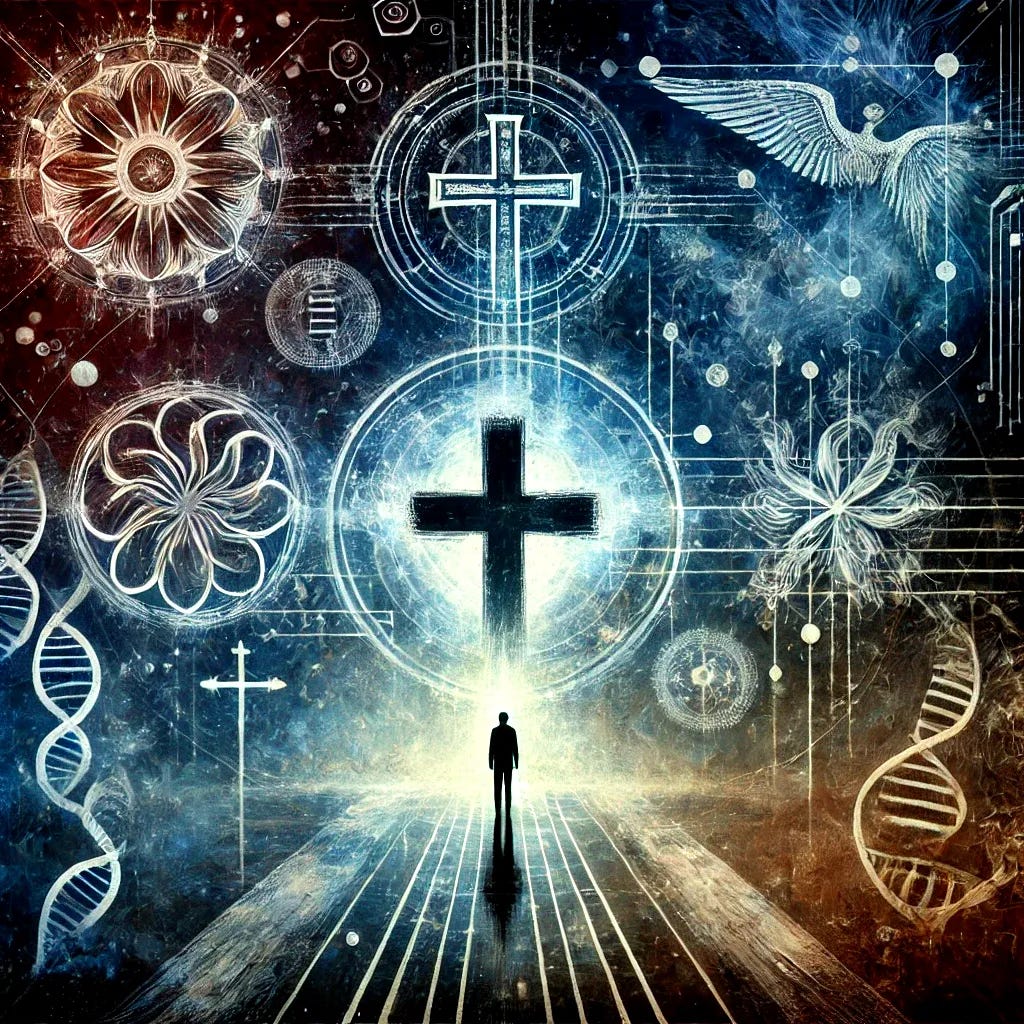I happened upon this video in which the presenter criticises certain Christian doctrines and how wrong and harmful they are. For example, he states that while Christian doctrine teaches you to deny your flesh, emotions, and feelings, you should embrace them instead—not giving in to every instinct but listening to what your body is telling you through your feelings. He argues that your body has your best interests in mind, and I find this both profound and true.
The entirety of the Christian faith revolves around salvation. The necessity for salvation is built on the doctrine that humanity is fallen, that we are all born in sin, and that we have a sinful nature—not because of what we've done, but because we inherited this sinful nature from Adam and Eve.
It is shocking how this story and doctrine still hold credence, even among educated individuals, when evolutionary and anthropological findings contradict the historicity of Adam and Eve. Furthermore, the fact of our genetic diversity disproves the notion that we descended from a single couple. Thus, no one is born a sinner.
As someone who was raised in the Christian religion, this is one belief I have had to unlearn. What makes it difficult is how vital this doctrine is to Christianity; it is not only foundational to the faith but also crucial to it. If we did not have a sinful nature—if there were no historical Adam and Eve from whom we inherited our sinful nature—then the death of Jesus is rendered pointless. I believe this is why Christian apologetics fight so hard to defend this story, even in the face of overwhelming evidence against it. This is why a narrative that is supposed to be a myth has been passed down as a historical truth for many years.
However, when this doctrine is taken as a factual truth instead of the myth that it is, it becomes both dangerous and harmful. I can trace many emotional and psychological problems that many individuals face back to it.
As Christians, we are taught that since we are born with a sinful nature, we should not trust anything that comes from within us. We are to deny our emotions and feelings because they are of the fallen man. We are instructed not to rely on our understanding and wisdom, as they are against God. Instead, we must adopt the nature of Christ and await God’s will and direction.
The emotional, psychological, and even mental problems that arise from this belief are evident. While there is an obvious dissonance between doctrine and reality, there are adults who are lost to themselves because they are not in touch with their personalities, which they have been indoctrinated to believe are evil and sinful. As a result, they struggle with self-worth, decision-making, and even fail to develop the ability to question both doctrine and authority figures, thereby missing out on the emotional and intellectual freedom that every healthy adult should enjoy.
Unlearning this doctrine would not be so hard if Christians had not been taught that the Bible is the literal word of God. Hence, any evidence put forward against their doctrine is deemed irrelevant. Just like the apologetics who engage in mental gymnastics to defend their myths and superstitions, I believe Christians are willing participants in a form of folie à deux—knowingly engaged in a shared delusion. This might be because the faith has become their entire identity or because they derive power, respect, relationships, or even emotional support from it.
As a nominal Christian, while I do not take Christian stories and myths as factual truths, I believe that the Christian faith provides one with a philosophical framework to, if not understand, at least navigate the human experience.
We might not have been born in sin and are not destined for a literal hell because of this; neuroscience and the behavioural sciences may have even provided us with explanations for why people do evil things. However, I also believe that the Christian myths of Adam and Eve, the doctrine of original sin, and salvation were proposed to tackle this exact question as well. If utilised within this context, they can be helpful.
So, while I agree with much of what was said in the video, I think there needs to be some balance. Many criticisms of religion tend to focus on its scientific and ideological flaws and, like me, wonder why people still hold on to it. Yes, religious texts are rife with scientific errors and historical inaccuracies. We also know that these texts are often misogynistic and promote gender inequality. But even with all of that, there are still deeper, epistemic frameworks within these myths that can help us make sense of the human experience.
I also think that both religious and irreligious individuals alike misunderstand the difference between myths, fiction, and superstition.
Myths are not lies. They are traditional stories or narratives that explain the origins and worldviews of a culture and how they perceive and understand the human experience. While they possess both existential and philosophical depth and even moral utility, they are not scientific. They are instead worldviews that people adopt to explain their existence before science. Therefore, while they aren't lies per se, they aren't factual either. They are part of what Yuval Noah Harari calls "fiction." They are creations of human imagination.
According to Yuval Noah Harari, fiction encompasses any kind of story or narrative that humans create and share, which may not necessarily be true or real in a factual sense. Harari explains that fiction includes not only literary works like novels and myths but also broader concepts such as religions, ideologies, and social constructs that shape human societies and behaviours. He suggests that the power of fiction lies in its ability to create shared beliefs and imagined realities that influence human actions and collective behaviour.
Superstitions, however, are beliefs or practices based on the idea that certain actions, events, or objects can influence future outcomes, often through supernatural or unexplained forces. Superstitions are typically individual or local and usually involve cause-and-effect relationships that aren't scientifically supported.
When viewed rightly within this context, one can see the utility of certain myths.
First, I would like to emphasise that we shouldn’t adopt myths to solve any problem that science has already addressed. Myths aren’t scientific and are limited to the worldview from which they originate. However, I do not think that myths are entirely useless and should be discarded. There are certain existential issues that science has no solution for. I believe these are some of the questions we need myths for, pending when and if science provides answers to them.
Take the problem of evil as an example. The behavioural sciences, including psychology, neuroscience, and even economics, have given us the root causes of actions that we might label as evil. For instance, we know that psychopathy is a personality disorder caused by certain dysfunctions in the brain. But when a serial killer takes the life of someone’s child, does this fact provide any emotional solace to the parents? This is the kind of situation where people might turn to spirituality and religion for comfort. And religion and spirituality derive their beliefs and ethos from myths.
There are several questions grieving parents might ask. The existential and philosophical dimensions of these questions often demand that we turn to religion, not science, to provide answers.
How does science explain the cause of human suffering? How does it explain time and chance, fate and destiny?
This is where myths can be utilised, for within their narratives, one can find explanations for existential questions.
How does science explain the cause of human suffering? It doesn’t. But one can turn to the fictitious story of Job, and if they don’t find an answer, they’ll find resonance. The story of Job tells us that human suffering isn’t always a consequence of our actions. People suffer because of cosmic chaos that isn’t within their control.
The story of Cain and Abel isn’t merely a myth about a brother who killed another; it also provides insight into the nature of human jealousy and envy. It illustrates how to respond to rejection from authority and how best to deal with anger and resentment.
The myth of Oedipus is another story that has sustained relevance and resonance through the ages. And why? It illustrates the enduring conflict between free will and fate. It reminds us that much of what happens to us in life is well beyond our control and serves as a reminder of the inevitability of tragedy.
Even the ethics and morality that guide our civilisation are derived from myths. Stories about actions and consequences and moral responsibility are shaped by myths. Archetypes—universal symbols, patterns, characters, and stories that influence human behaviour, culture, and beliefs and are deeply rooted in our collective subconscious—are also influenced by myths. The story of Jesus, his death and resurrection, is an archetype that not only shows us how the collective can rage against the one who is morally pure or whose existence and actions challenge their moral failings, but it also typifies the hero archetype that can inspire one to embrace suffering for the collective good or even for one’s glory. His death and resurrection assure us of the enduring power of truth to prevail over death.
One should never elevate their religious doctrines and myths over scientific truth and historical facts. And I even consider it morally wrong and epistemic insincerity to explain away the ideological flaws in one’s religion over objective and scientific truth. Yet, I believe that religious myths can provide us with a valuable philosophical framework for navigating the complexities of the human experience. We can use them to answer questions about the existential challenges of life, to find comfort and peace amid suffering, to find hope and faith despite the cosmic devastation and to find our place and purpose in the world.


